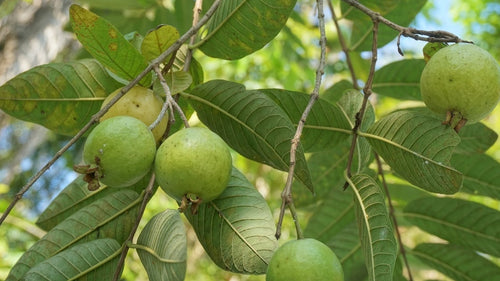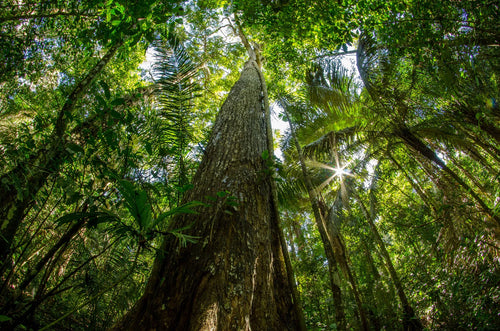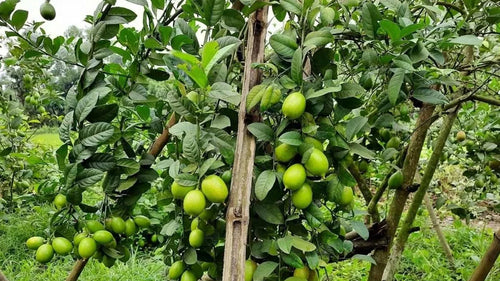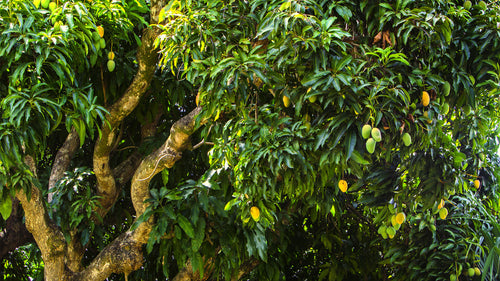Digester to Forest: Sistema.bio’s Regenerative Agroforest Drive
Sistema.bio, a global leader in renewable energy solutions for smallholder farmers, has taken a significant step toward environmental restoration thro Read more
Plantation Site Gallery
Project Update 4
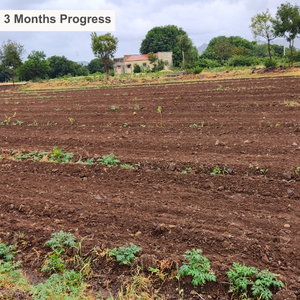
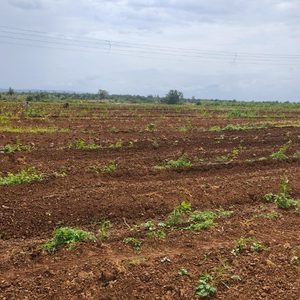
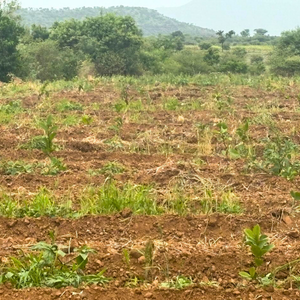
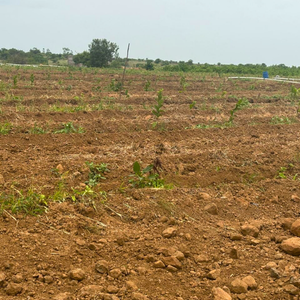
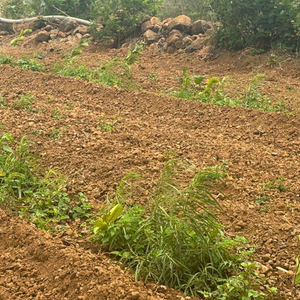
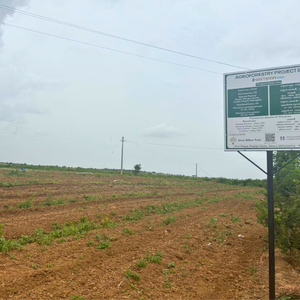
Project Update 3
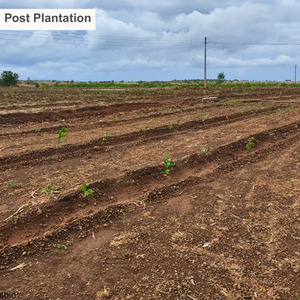
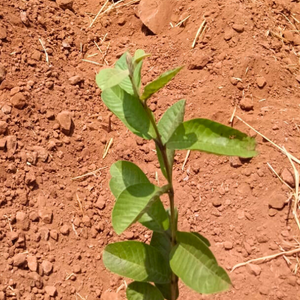
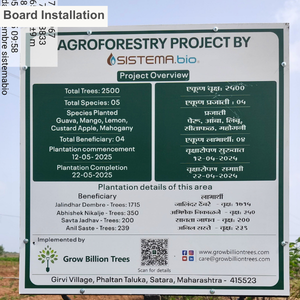
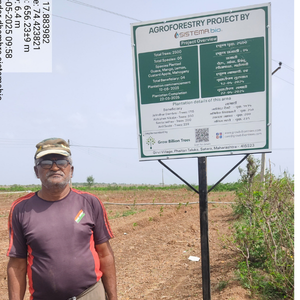

Project Update 2
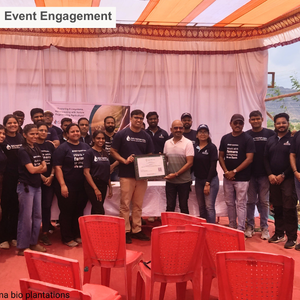

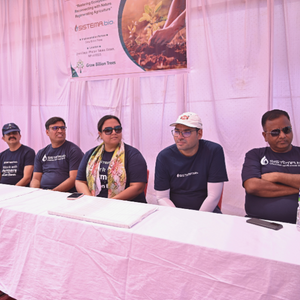
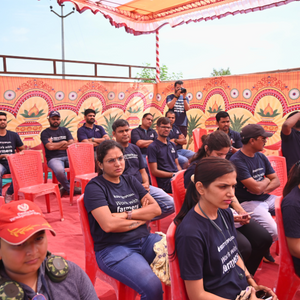
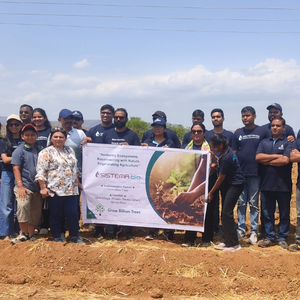
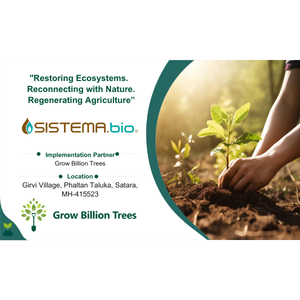
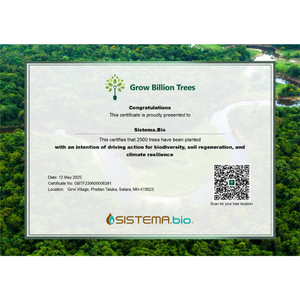
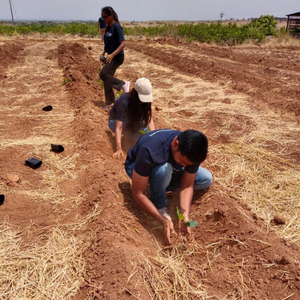
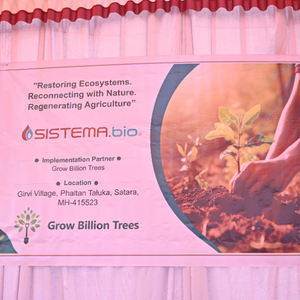
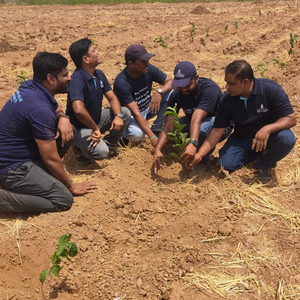
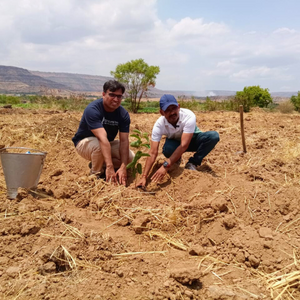
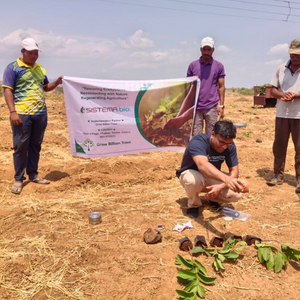
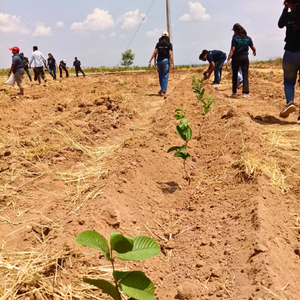
Project Update 1
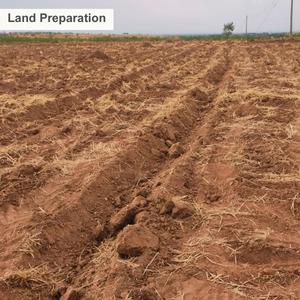
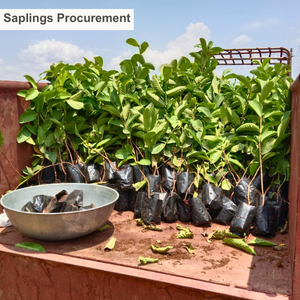
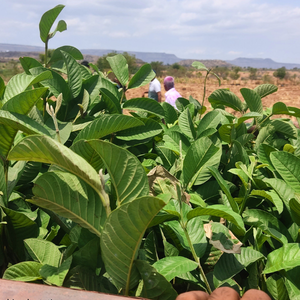
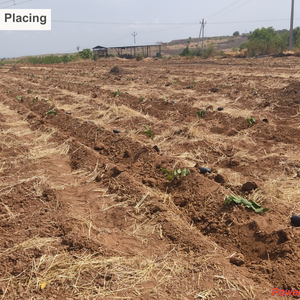
Digital Forest
Forest with 2,500 Trees planned
Want to plant your tree now?
Plant a Tree @ 299Digester to Forest: Sistema.bio’s Regenerative Agroforest Drive
Sistema.bio, a global leader in renewable energy solutions for smallholder farmers, has taken a significant step toward environmental restoration through its tree plantation initiative grounded in the agroforest concept, with a deep-rooted belief that every action matters, Sistema.bio has planted 2,500 trees to strengthen its commitment to sustainability and regenerative agriculture.
This initiative is not just about planting trees; it’s about cultivating life. By integrating tree plantations into agroforestry systems, the company is restoring degraded ecosystems, enhancing local biodiversity, and improving soil health. These efforts directly contribute to farmers’ livelihoods, enhanced income resources, and reduced farming costs. The trees provide shade, prevent erosion, sequester carbon, and contribute to more resilient farming landscapes. For farmers using Sistema.bio’s biodigester technology, these trees complement renewable energy and organic fertilizer systems, reinforcing a closed-loop, self-sustaining farm model.
The effort also symbolizes a powerful reconnection with nature, reminding stakeholders from farmers to employees of their shared responsibility toward the planet. By supporting regenerative agriculture through tree plantation, Sistema.bio is not only improving farm productivity and household well-being, but also making a lasting, positive impact on the future of our Earth.
Project Planning & Execution
No of Trees: 2500
Plantation Location: Girvi, Phaltan, Satara, Maharashtra 415523
Plantation Duration: 12th May 2025 to 22nd May 2025
Name of Species: Guava, Mango, Lemon, Custard Apple, Mahogany
Species Selection & Its Benefits
The project emphasizes planting native and locally suited tree species, ensuring high survival rates and long-term ecological health while aligning with local market demand to provide farmers with viable income opportunities. Farmer consent is integral to the selection process, ensuring each species complements existing agricultural practices and supports sustainable land use.
The project strategically selected Guava (Psidium guajava), Mango (Mangifera indica), Lemon (Citrus limon), Mahogany (Swietenia macrophylla), and Custard Apple (Annona squamosa) for their diverse ecological, economic, and social benefits. Guava and Lemon, both hardy and low-maintenance, offer reliable annual income through fruit production while improving soil fertility and supporting pollinators. Mango trees provide long-term financial returns due to their market demand and contribute to microclimate regulation. Mahogany adds value as a timber species, aiding in carbon sequestration and future income potential. Custard Apple, a drought-tolerant and fast-bearing fruit tree, thrives in poor soils and offers seasonal income while enhancing biodiversity. Together, these thoughtfully chosen species strengthen both environmental sustainability and the economic stability of local communities.
Beneficiaries Details
| SN | Farmer Name | Google Location | Village Name | Plot Size | Guava Planted | Mango Planted | Custard Apple Planted | Lemon Planted | Mahogany Planted |
| 1 | Jalindhar Dhembre | https://short-link.me/12qRF | Girvi | 1.9 Acre | 1640 | 20 | 10 | 20 | 25 |
| 2 | Savta Jadhav | https://surl.li/jowrvg | Girvi | 0.5 Acre | 0 | 0 | 0 | 180 | 20 |
| 3 | Abhishek Nikalje | https://surl.lt/smgohf | Girvi | 0.4 Acre | 0 | 300 | 0 | 0 | 50 |
| 4 | Anil Saste | https://rb.gy/b4y24q | Girvi | 0.2 acre | 239 | 0 | 0 | 0 | 0 |
Planting Methodology and Its Advantages
Agroforestry:
Sistema.bio embraced agroforestry, a sustainable practice that combines trees and crops on the same land, to drive meaningful environmental and social impact. By facilitating the plantation of fruit-bearing and timber trees, the initiative contributes to improving soil health, enhancing biodiversity, and strengthening farmers’ livelihoods through increased income opportunities. With a focus on transparency, accountability, and grassroots transformation, Sistema.bio is cultivating a greener tomorrow one tree at a time while supporting resilient rural communities and a sustainable future.
Advantages of Agroforestry
-
Increased Farmer Incomes: This approach helps increase farmers' income by as much as 3 times. Farmers benefit from diversified income sources, lifting economic resilience.
-
Sustainable Livelihoods: Farmers benefit from diversified income sources through the sale of fruits and other tree-based products, reducing dependence on a single crop.
-
Enhanced Biodiversity: Agroforestry creates a diverse ecosystem by integrating trees with crops, attracting pollinators, birds, and beneficial insects that support natural pest control.
-
Environmental Sustainability: This model reduces carbon emissions and promotes sustainable land management, aligning with SDG 13 (Climate Action) and SDG 15 (Life on Land).
-
Food Security & Nutritional Benefits: Fruit-bearing trees provide a direct source of food, improving local nutrition while supporting long-term agricultural productivity.
-
Carbon Sequestration & Climate Resilience: Trees absorb carbon dioxide, helping mitigate climate change while providing shade and windbreaks that reduce temperature extremes and improve microclimatic conditions.
-
Soil Health and Water Conservation: Tree roots prevent soil erosion, enhance water retention, and improve soil fertility by fixing nitrogen and adding organic matter. Agroforestry systems also support groundwater recharge, reduce runoff, and improve soil moisture retention, making them ideal for drought-prone regions.
Activities During Tree Plantation
Sistema.bio's tree plantation initiative was designed with a dual purpose: to reduce carbon footprints and to create a lasting environmental and social impact. In alignment with the company's commitment to sustainability, the plantation site at Girvi, Phaltan, was meticulously prepared in advance by local farmers, ensuring optimal conditions for the saplings.
The event began with an inaugural ceremony graced by the presence of Mr. Piyush Sohani (Chief Growth Officer and India MD), Mr. Atul Mittal (South Asia Director for Business Development), Ms. Neha Arora (VP – People & Culture), Mr. Chintamani Dandekar (VP of Finance), and other Sistema.bio employees. They were warmly welcomed by Grow Billion Trees (GBT) volunteers, who also shared the vision and mission behind the plantation initiative, emphasizing the importance of ecosystem restoration, biodiversity enhancement, and regenerative agriculture. A small poojan was performed by Mr. Piyush Sohani, marking an auspicious beginning and invoking blessings for the success of the initiative.
Following the ceremony, all participants, including Sistema.bio’s leadership, employees, GBT volunteers, and local farmers, actively took part in planting and watering the saplings, reinforcing the spirit of collective responsibility and environmental stewardship. A diverse mix of fruit-bearing and timber species was carefully selected for their carbon-capturing capabilities and potential to boost local biodiversity. The group effort ensured that each sapling was thoughtfully placed and nurtured, laying the foundation for a thriving, green landscape.
By embedding carbon-offsetting and biodiversity enhancement into its operations, Sistema.bio reinforced its mission of environmental stewardship and sustainable development. The initiative reflects the company’s dedication to building a greener future where every action and every tree planted supports the vision of improving life on Earth. The event wrapped up on a warm and cheerful note with light refreshments, bringing together employees, farmers, GBT volunteers, and community members in a shared celebration of sustainability.
Conclusion Elements
Impact
Direct Impact
| Parameters | Values | References |
| No. of Trees Planted | 2,500 | |
| Green Cover (Acres) | 3.2 | |
| Fruit Production Potential (Tons/Year) | 61.18 | |
| Timber Production Potential (Tons) | 79.8 | |
| Income Generation Potential (Rs/Year) | ₹2,565,875 | |
| Carbon Sequestration Potential (KG) | 20 |
Small to medium-sized trees can sequester around 10–48 kilograms (22–106 pounds) of CO₂ annually. https://growbilliontrees.com/blogs/knowledge/how-much-co2-can-one-tree-absorb |
| Carbon Sequestration by 2500 mature trees ( Tons/year) | 50 Tons | No. of Trees x Carbon Sequestration by 1 mature trees per year |
| Carbon Credit Equivalent | 50 | One carbon credit is equivalent to one tonne of carbon dioxide or the equivalent amount of another greenhouse gas. |
| Carbon Footprint of an avg Indian Citizen (Tons/Year) | 1.8 | https://www.iea.org/countries/india/emissions |
| Offsets Annual Carbon Footprint of (Adults) | 28 | Carbon offset by 2500 mature trees per year / Carbon Footprint of an avg Indian Citizen per year |
(This impact analysis is forward-looking (An Agroforestry project matures in 3-5 years)
Indirect Impact
Community Impact
-
Empowerment of Farmers - By providing training and resources for sustainable farming practices, agroforestry equips farmers with skills to enhance productivity and adapt to environmental changes.
-
Food Security – By integrating fruit-bearing trees into agricultural systems, the initiative ensures a stable food supply, providing nutritious produce for both consumption and market sale.
-
Environmental Awareness – The project educates the local community on the importance of tree planting, biodiversity conservation, and sustainable land use.
-
Enhanced Social Equity – Agroforestry initiatives foster enhanced social equity by empowering marginalized farmers with sustainable livelihoods, bridging economic gaps, and promoting inclusive community participation in environmental conservation efforts.
-
Resilience to Climate Change – Agroforestry improves soil health, enhances water retention, and reduces land degradation, making farming communities more adaptable to changing climate conditions.
-
Health and Well-being – Increased green cover improves air quality, reduces heat stress, and provides access to nutrient-rich fruits, contributing to the overall health of local communities.
Environmental Impact
-
Carbon Sequestration: Trees act as carbon sinks, absorbing significant amounts of CO2 from the atmosphere, helping to mitigate climate change and reduce greenhouse gas emissions.
-
Soil Health Improvement: Agroforestry enriches soil through organic matter from fallen leaves and roots, improving fertility, structure, and nutrient availability for crops.
-
Erosion Prevention: Tree roots stabilize the soil, reducing erosion caused by wind and water while protecting nearby agricultural fields and water bodies.
-
Biodiversity Conservation: By creating habitats for various species, agroforestry enhances biodiversity, supporting pollinators, beneficial insects, and native wildlife.
-
Water Cycle Regulation: Trees improve water retention, recharge groundwater levels, and reduce surface runoff, contributing to a more balanced and sustainable water cycle.
-
Microclimate Regulation: Agroforestry moderates temperature extremes, reduces wind speeds, and increases humidity, creating favorable conditions for crop growth and ecosystem balance.
Achievements
SDG Goals Achieved through Agroforestry
-
SDG 1: No Poverty – By integrating agroforestry with traditional farming, Sistema.bio's initiative provides farmers with additional income sources through fruit yields, improving economic resilience, and reducing poverty in rural areas.
-
SDG 2: Zero Hunger – The plantation of fruit-bearing trees enhances food security by offering nutritional produce while improving soil health for sustainable agricultural productivity.
-
SDG 3: Good Health and Well-Being – Tree plantations improve air quality, soil fertility, and water conservation, creating a healthier environment for local communities. The presence of green spaces also promotes mental well-being.
-
SDG 4: Quality Education – Sistema.bio's agroforestry initiative includes farmer training on sustainable land-use practices. These educational efforts equip farmers with knowledge on conservation, resource management, and climate-resilient agriculture.
-
SDG 6: Clean Water and Sanitation – By reducing soil erosion, improving groundwater recharge, and minimising surface runoff, the plantation promotes sustainable water management in the region.
-
SDG 8: Decent Work and Economic Growth – The initiative generates employment opportunities for rural communities, provides training in sustainable agroforestry, and supports long-term economic growth through enhanced land productivity.
-
SDG 9: Industry, Innovation, and Infrastructure – The Sistema.bio project integrates innovative agroforestry techniques, including multi-layer cropping systems and soil conservation methods, fostering sustainable land use and industry-community collaboration.
-
SDG 10: Reduced Inequalities – By involving small-scale and marginalised farmers, the project promotes economic inclusivity and reduces inequalities by ensuring equitable access to agroforestry benefits.
-
SDG 12: Responsible Consumption and Production – Agroforestry reduces dependency on chemical inputs, promotes organic farming, and ensures the responsible use of natural resources, supporting sustainable agricultural practices.
-
SDG 13: Climate Action – The planted trees act as carbon sinks, sequestering atmospheric carbon dioxide, enhancing ecosystem resilience, and mitigating the effects of climate change in the region.
-
SDG 15: Life on Land – This initiative promotes biodiversity conservation, prevents deforestation, and restores degraded land, fostering healthy ecosystems and sustainable forestry practices.
-
SDG 17: Partnerships for the Goals – The collaboration between Sistema.bio, Grow Billion Trees, and local farmers demonstrate the power of partnerships in achieving sustainability goals and fostering large-scale ecological restoration.
ESG Achieved through Agroforestry:
-
Environmental Impact: Sistema.bio's agroforestry initiative plays a crucial role in environmental sustainability by enhancing carbon sequestration, restoring biodiversity, and improving soil and water conservation. The plantation of native and fruit-bearing trees supports climate change mitigation by reducing greenhouse gas emissions and increasing ecosystem resilience. Additionally, the project helps prevent soil erosion, improves groundwater retention, and contributes to a healthier, greener landscape. By integrating sustainable agroforestry practices, this initiative ensures long-term ecological benefits, fostering a self-sustaining environment that supports both nature and local communities.
-
Social Impact: The initiative brings significant social benefits by fostering sustainable livelihoods, improving food security, and enhancing community well-being. By integrating fruit-bearing trees, the project helps farmers diversify their income sources, ensuring greater economic stability and resilience for rural households. Agroforestry practices optimise land use efficiency, leading to higher agricultural productivity while maintaining ecological balance. The plantation also contributes to better air quality, creates green spaces for community well-being, and encourages local participation through awareness programmes. By engaging and educating stakeholders, the initiative empowers communities with the knowledge and skills to adopt sustainable land management practices, fostering long-term environmental and social sustainability.
-
Governance Impact: Sistema.bio upholds strong governance principles by committing to ethical and responsible corporate practices in sustainability. The agroforestry initiative aligns with Sistema.bio's goal, ensure transparency, accountability, and long-term impact. By collaborating with Grow Billion Trees, farmers and local communities, Sistema.bio fosters strategic partnerships that promote environmental stewardship and responsible land management. This initiative reflects the company’s dedication to integrating ESG (Environmental, Social, and Governance) principles into its corporate framework, showcasing leadership in sustainability and social responsibility.
Building Communities
Sistema.bio's agroforestry initiative goes beyond tree plantation, it strengthens rural communities by empowering farmers, fostering collaborations, and creating sustainable livelihoods. By integrating environmental stewardship with social impact, the project nurtures a sense of shared responsibility, driving long-term benefits for both people and the planet.
-
Empowering Farmers: Sistema.bio's agroforestry initiative strengthens farmers’ economic stability by diversifying income sources and improving agricultural productivity. By integrating tree plantations with existing farmland, farmers benefit from enhanced soil fertility, better crop yields, and long-term financial gains. This initiative promotes self-sufficiency and long-term environmental stewardship, ensuring a sustainable future for both farmers and the ecosystem.
-
Fostering Partnerships: Collaboration is at the core of Sistema.bio's plantation initiative, bringing together corporate, environmental, and community stakeholders. The partnership between Sistema.bio, Grow Billion Trees, and local farmers created a strong foundation for sustainable development. By leveraging collective expertise and resources, this initiative ensures that environmental and social benefits extend beyond the immediate plantation, fostering long-term ecological and economic resilience.
-
Creating a Ripple Effect: The impact of this initiative goes beyond tree planting; it sets in motion a chain reaction of positive environmental and social change. By improving biodiversity, enhancing carbon sequestration, and promoting sustainable farming, the project contributes to a healthier ecosystem. Additionally, as more farmers adopt agroforestry practices, the region experiences long-term economic and environmental benefits, inspiring further community-driven conservation efforts.
This initiative proved that environmental sustainability thrives when rooted in community effort. It’s not just about planting trees, it’s about planting hope, collaboration, and a shared vision for a greener tomorrow.
Commitment by Grow Billion Trees
-
Ensuring Tree Survivability: GBT prioritizes native species, continuous monitoring, and soil health improvement using organic fertilizers. These efforts ensure sustainable growth and benefit the farmers and communities.
-
Transparency & Accountability: GBT provides detailed reports on tree growth, survival rates, and carbon benefits, using geo-fencing and regular updates to maintain transparency and effectiveness.
-
Sustainable Plantation Efforts: GBT implements projects that balance environmental, social, and economic goals, addressing urban heat islands and degraded farmlands. These efforts promote ecological balance, livelihoods, and long-term climate resilience.
-
Enhancing Ecosystem Health: By selecting native species and creating diverse habitats, GBT enhances biodiversity and ecosystem resilience, ensuring long-term ecological health and supporting wildlife.
-
Long-Term Impact: GBT’s initiatives tackle environmental challenges, enhance rural livelihoods, foster climate resilience, and promote sustainable development while reducing carbon footprints.
Acknowledgment
We extend our heartfelt gratitude for the successful completion of the plantation initiative at Girvi, Phaltan, Satara, Maharashtra. This achievement represents a significant step towards environmental restoration, sustainable land use, and community empowerment. It would not have been possible without the collective efforts of dedicated individuals, local farmers, and partner organisations. Their unwavering commitment has played a crucial role in fostering a greener, more resilient ecosystem for future generations.
To Sistema.bio: We sincerely thank Sistema.bio for their unwavering dedication to sustainability and environmental conservation. By integrating agroforestry into its mission to reduce its carbon footprint, Sistema.bio has demonstrated a strong commitment to fostering greener landscapes and supporting local communities. We deeply appreciate Sistema.bio's initiative in planting 2500 trees of native species. This effort will enhance biodiversity, improve soil health, and contribute to carbon sequestration, ensuring long-term ecological and economic benefits. Moreover, by promoting sustainable land use, this initiative plays a vital role in supporting farmers, providing them with an additional source of income through fruit production. Sistema.bio's dedication to environmental sustainability and community upliftment is truly commendable, and we are grateful for their contribution to a greener and more resilient future.
To the Farmers of Satara: Your dedication to embracing agroforestry and incorporating fruit-bearing trees into your farming practices is truly commendable. This initiative not only enriches soil health but also strengthens long-term agricultural sustainability. Your commitment to fostering a healthier ecosystem while securing a better future for future generations is inspiring. We are grateful to be part of this journey and look forward to witnessing the lasting positive impact of your efforts.
To Our Ground Partners and Volunteers: Your dedication, expertise, and passion for environmental conservation have been essential in making this initiative a success. Through our collective efforts, we have shown that collaboration and a shared vision for sustainability can create a lasting impact. Your invaluable contributions have played a crucial role in driving this mission forward, and we deeply appreciate your commitment. Thank you for being an integral part of this journey toward a greener future.
Through this collective effort, we have taken significant steps toward revitalizing ecosystems, promoting sustainable agriculture, and enhancing the livelihoods of farmers in Satara. This is just the beginning, and we look forward to strengthening our partnership in pursuit of a greener, more sustainable future for all.
Thank you for your unwavering commitment and support.
Closing Remarks
The successful completion of the agroforestry plantation at Girvi, Phaltan, Satara, Maharashtra, marks a significant milestone in Sistema.bio's journey towards environmental sustainability and community empowerment. This initiative has not only expanded the region’s green cover but has also provided long-term benefits to local farmers by integrating sustainable agricultural practices.
By enhancing soil fertility, supporting water conservation, and generating additional income through fruit production and other byproducts, the project strengthens livelihoods and promotes financial stability for farming communities. With 2500 trees now flourishing, this initiative will continue to contribute to ecological balance, biodiversity restoration, and climate resilience.
As we celebrate this achievement, we reaffirm our commitment to driving impactful sustainability efforts and inspiring more organisations and individuals to take action for the environment. We extend our deepest gratitude to Sistema.bio, the farmers of Satara, our partners, and all those who contributed to making this project a success. Your dedication and collaboration have been instrumental in turning this vision into reality.
This is just the beginning of a larger movement towards a greener and more sustainable future. Through collective efforts, we can build a resilient environment and leave a lasting legacy for generations to come.
Trees for Corporates
Trending
Most Popular
1. Sistema.bio tree plantation drive
a tree growing beside a biodigester, purifying the air while farmers use bio-slurry to fertilize crops. That’s farm symphony! The plantation drive improves biodiversity, reduces emissions, and supports farmer income—all while looking incredibly green and proud. If saving the world had a mascot, Sistema.bio’s tree would be it. The best part? It’s not just planting trees, it's planting purpose. So the next time you see a sapling sprouting beside a compost pit, give it a high-five—it could be part of Sistema.bio’s tree revolution.
2. Agroforest and renewable energy integration
When trees meet tech, magic happens. Agroforestry and renewable energy aren’t just trendy buzzwords—they’re Sistema.bio’s dynamic duo. Think of it as nature and science doing a happy dance on the farm. With biodigesters turning cow dung into clean energy, and trees restoring ecosystems, it's a full-circle moment—literally. Trees suck carbon, biodigesters slash methane, and farmers save cash. You get more productivity per acre, and less guilt per footprint. This combo is like peanut butter and jelly, but for the climate! Sistema.bio doesn’t just build infrastructure; they build futures rooted in green living. Agroforest and renewable energy integration means farmers get shade, soil nutrition, and biofuel—all without burning a single fossil. The future isn't solar panels alone—it's solar, slurry, and saplings in harmony.
3. Regenerative agriculture with tree plantation
bold, powerful, and totally regenerative. Trees act like VIPs in the ecosystem—cooling, shading, fertilizing, and increasing crop yield. Sistema.bio’s combo of biodigester and tree plantation makes each farm a mini powerhouse of regeneration. It’s not farming—it’s future-proofing. Say goodbye to land degradation and hello to biodiversity concerts right outside the barn. Regenerative agriculture never looked so lush.
4. Farmer income through agroforestry
Money might not grow on trees, but for Sistema.bio farmers, it kinda does. Through agroforestry, trees become an extra income stream—think fruits, timber, fodder, and even honey! Sistema.bio helps farmers diversify income while reducing costs, thanks to their smart mix of biodigesters and tree plantations. Biodigesters slash fertilizer and fuel costs; trees offer tangible produce. It's like upgrading your farm to premium without paying the subscription fee. Plus, healthier soil = better crops = more ka-ching! This isn’t just sustainability—it’s sustainable profit. If your farm isn’t growing trees, are you even trying to be financially fabulous?
5. Biodigester and agroforest synergy
recycle, regrow, repeat. Who knew cow dung could lead to such a glowing glow-up?
6. Sustainable farming solutions by Sistema.bio
Sistema.bio’s approach to farming is anything but old-school. Say goodbye to smoky stoves and sky-high fertilizer bills. Say hello to cow-powered clean energy and shade-giving, life-enhancing trees. Their sustainable farming solutions are smart, scalable, and seriously effective. By combining biodigester technology with agroforest plantations, they help farmers leap into the 21st century without leaving nature behind. These aren’t short-term fixes—they’re long-term legacies. From reducing emissions to rejuvenating soil, Sistema.bio’s farming toolkit is the stuff carbon-neutral dreams are made of. And let’s be honest, “My fuel comes from cow poop and I plant trees” might just be the best elevator pitch in climate tech.
7. Tree plantation for climate action
Planting a tree might not solve global warming overnight, but 2,500 of them sure make a statement. Sistema.bio’s tree plantation initiative is climate action with roots—literally. These aren’t just trees; they’re frontline climate warriors. They sequester carbon, restore water cycles, and reduce land erosion. Paired with biodigesters that reduce methane, it’s like a climate double-whammy. Sistema.bio isn’t here for symbolic gestures—they’re engineering action. Each planted sapling is a green “mic drop” to the fossil-fueled status quo. So if you’re wondering how tree plantation fits into climate solutions, just follow the root trail to Sistema.bio.
8. Biodiversity enhancement through agroforestry
birds chirp, bees buzz, microbes multiply, and suddenly your farm is hosting a full-blown nature rave. Agroforestry enhances biodiversity in ways monoculture never could. Sistema.bio’s tree plantation initiative breathes life into barren landscapes, turning them into ecological wonderlands. And the benefits aren’t just for the butterflies. Diverse ecosystems mean better pest control, richer soil, and happier crops. It’s the farm version of adding avocado to everything—it just makes it better. Thanks to Sistema.bio, biodiversity is no longer a buzzword—it’s a lifestyle.
FAQ
What is the goal of Sistema.bio’s tree plantation initiative?
At Sistema.bio, our goal is to make every action count toward a healthier planet. Our tree plantation initiative aims to restore ecosystems, enhance biodiversity, and support regenerative agriculture. By planting 2,500 trees in agroforest systems, we’re helping farmers improve their livelihoods while making farms more resilient and sustainable. It’s our way of reconnecting with nature and creating lasting environmental impact.
How does tree plantation benefit smallholder farmers in India?
Tree plantation through agroforestry offers multiple benefits to Indian farmers. It improves soil quality, provides shade, prevents erosion, and opens up new income sources like fruits, timber, or fodder. At Sistema.bio, we integrate trees with our biodigester systems to reduce farming costs, boost productivity, and increase farmers' income sustainably. It’s farming with nature, not against it.
How does Sistema.bio integrate agroforestry with biodigesters?
Sistema.bio combines clean energy technology with nature-based solutions. Our biodigesters convert waste into biogas and bio-slurry. When trees are planted in agroforestry systems, the bio-slurry acts as an organic fertilizer. This creates a closed-loop system where energy, nutrition, and ecosystem restoration go hand-in-hand, improving overall farm efficiency and environmental impact.
Why is agroforestry important for climate action?
Agroforestry plays a vital role in climate action by capturing carbon, improving water retention, and reducing land degradation. At Sistema.bio, we see agroforestry as a scalable solution to combat climate change. Trees support biodiversity and reduce dependence on synthetic inputs, creating farms that are more climate-resilient and environmentally friendly.
What kind of trees does Sistema.bio plant in its agroforestry projects?
We select native and multipurpose tree species that thrive in local climates and serve various farm needs. These may include fruit trees, nitrogen-fixing species, and trees that support animal fodder or timber. Each tree is chosen with farmers' benefits and ecological balance in mind, ensuring long-term sustainability.
How does tree plantation help improve farm productivity?
Tree plantation boosts productivity by improving soil fertility, regulating temperature, and enhancing water retention. When integrated with Sistema.bio’s biodigester systems, farms enjoy healthier soil, organic fertilizer, and reduced input costs. Trees also attract pollinators and beneficial insects, creating a balanced ecosystem that supports crop growth naturally.
Can tree plantation reduce farming costs for Indian farmers?
Absolutely. Tree plantation lowers the need for chemical fertilizers, reduces irrigation demands, and can supplement farmers’ income through timber, fruits, and other resources. At Sistema.bio, our model helps farmers cut down energy and fertilizer expenses by combining biodigester systems with agroforestry, creating cost-efficient and productive farms.
How does Sistema.bio’s work support biodiversity in rural India?
Our agroforestry approach enhances biodiversity by creating habitats for birds, insects, and small animals. With more plant variety and natural balance, farms become mini-ecosystems. By using bio-slurry and planting native trees, we ensure healthier soil, richer microbial activity, and a stronger ecological footprint on every farm we partner with.
What is the environmental impact of Sistema.bio’s tree plantation drive?
Our 2,500-tree plantation drive helps sequester carbon, restore degraded land, and enhance water retention. Paired with biodigester use, it reduces methane emissions and synthetic input dependency. This dual-impact approach improves the environment, supports local communities, and aligns with global climate goals. We see it as a grassroots solution to a global issue.
How does Sistema.bio empower farmers through agroforestry?
We empower farmers by providing technology, training, and support for sustainable farming. Agroforestry gives them new income opportunities, while our biodigesters lower costs and offer clean energy. Together, they create self-reliant farms that are productive, eco-friendly, and future-ready. At Sistema.bio, we believe empowered farmers grow more than crops—they grow change.
- Choosing a selection results in a full page refresh.
- Opens in a new window.



